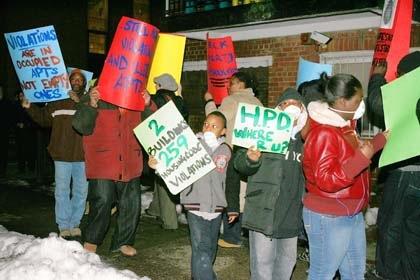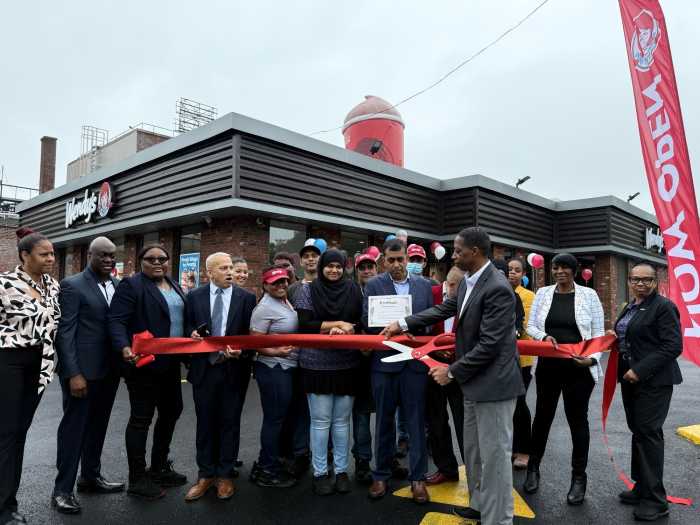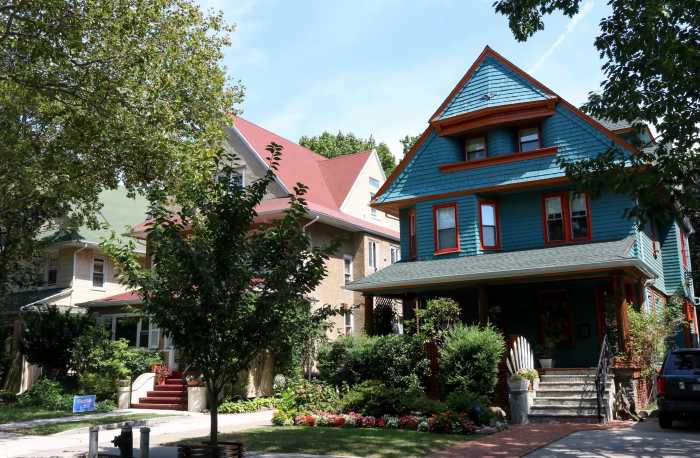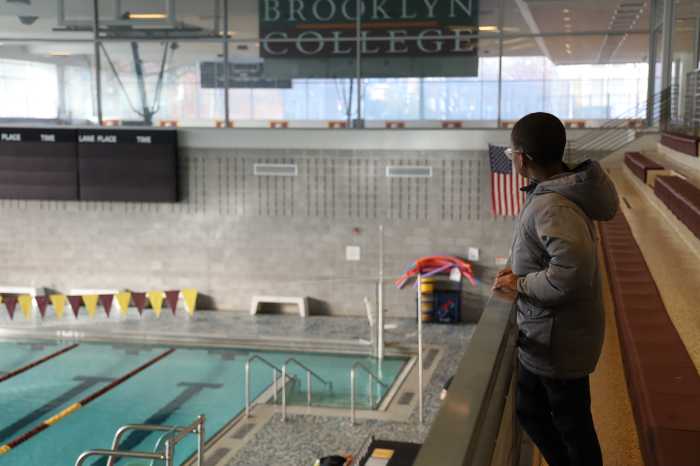Residents living in a pair of dilapidated Flatbush apartment houses took their complaints on the road, staging a nighttime protest in front of their landlord’s Boro Park home, that brought traffic, at times, to a standstill on 47th Street, as passersby stopped to see what was going on.
Wearing construction masks and carrying signs, tenants of 592 and 596 East 22nd Street took to the sidewalk outside the home of Samuel Fleischman, a principal in East 22nd Realty LLC, to dramatize the deplorable conditions in which they have lived for some time.
They said that, despite a consent stipulation entered into in January by the building owners, many of the 176 violations had not been repaired, including many categorized by the city’s Department of Housing Preservation and Development (HPD) as immediately hazardous (C class) or hazardous (B class), and that the building owners had concentrated on repairs to unoccupied apartments, rather than those occupied by tenants.
“Nothing has changed,” remarked tenant leader Tammy Brake, ticking off a laundry list of problems faced by the residents, including leaking sewage, bedbugs, rodents, and, most recently, dust from construction that has sent several residents to the emergency room, according to Aga Trojniak, of the Flatbush Development Corporation, which has been helping the tenants organize.
The landlord “had 14 days to repair the C violations,” noted Michael Grinthal, a staff attorney for South Brooklyn Legal Services who is working with the tenants. That period, Grinthal said, had ended on January 27th. In addition, Grinthal said, the landlord “had 30 days for B violations,” a period that ended on February 12th. The 75-day period for the least significant violations has not yet expired, Grinthal said.
“He’s done some repairs,” Grinthal told this paper, “but he’s focused on a bunch of vacant apartments to renovate, to re-rent.” Grinthal also said the landlord had told the tenants that “they can’t meet in the building,” which, he added, “is against state law.”
The request that tenants not meet in the building lobby was made by Mayer Waldman, the building’s managing agent, in a February 9th letter to Trojniak. “These areas, are the property of the owner, and per the signs posted, no loitering is permitted,” Waldman wrote.
However, Grinthal cited New York’s Real Property Law, which says, “Tenants’ groups. committees or other tenants’ organizations have the right to meet without being required to pay a fee in any location on the premises including a community or social room where use is normally subject to a fee which is devoted to the common use of all tenants in a peaceful manner, at reasonable hours and without obstructing access to the premises or facilities. No landlord shall deny such right.”
When Fleischman emerged from his home, he told this paper that he had only taken over the building in mid-January, so he didn’t understand why tenants were blaming him for conditions he has been working to correct. He had no connection to the prior owner, he and Waldman said repeatedly, but had simply assumed both the LLC name and the mortgage upon taking over the buildings. “Two months I’m there, running around, trying to fix everything,” Fleischman contended.
Waldman, for his part, said that efforts to fix inhabited apartments had been forestalled by tenants refusing him access, and suggested that the tenants who were demonstrating were doing so because they were behind in their rent. “One of the demonstrators here didn’t let us in till last week,” he asserted. He later said. “All the demonstrators are in court for not paying their rent. That’s the issue.”
As for the charge of renovating only empty apartments, Fleischman said he was doing so in order to move tenants into renovated apartments while he worked on the ones they vacated. “We are renovating by fours,” he said. But, he added, “Now, I don’t think I’m going to be that nice to the tenants. I’m suffering. Let them suffer.”
Grinthal and Trojniak rebutted the comments made by Fleischman and Waldman. Grinthal said that, legally, there appears to have been, “No change in partnership. Our understanding is another owner has stepped forward and said he’s in charge now.”
And, Trojniak said that she had seen Fleischman in the building, at a tenants meeting, as early as November. “If he took ownership of the building in January, why was he at a meeting in the building in mid November?” she asked.
A sentence in Waldman’s February 9th letter to Trojniak supports that view. He wrote, “We arrived at this building approximately 60 days ago, to improve conditions at the premises and to make it a better place to live.”
Tenants have not denied the landlord access, said Grinthal. While he had given “a list of suggested access dates” to the landlord’s attorney, the attorney “would not agree to put any specific dates in the order, and insisted that his clients would contact the tenants individually.” But, he said, the landlord “ignored access dates,” including ones stipulated to in “separate court cases.”
Nor were the protesters not paying their rent, said Trojniak, stressing, “Most tenants in the buildings are paying their rent in full, despite living in dangerous and unhealthy conditions. His claim that everyone at the protest isn’t paying their rent is false, plain and simple.”
As for Fleischman’s contention that he was moving tenants into renovated apartments while he fixed theirs, Trojniak had this to say: “If Mr. Fleischman had any concern for tenants living with the inconveniences of construction, he would make sure their lungs aren’t being filled everyday with construction dust and debris.” However, she added, the doors to apartments being worked on are “left wide open as workers tear out everything in them and then drag the debris through the building to take it outside.
“As far as I am aware,” she added, “only one tenant has moved from her apartment into a different one, but that’s only because South Brooklyn Legal Services forced the owners to do it. The ‘new apartment she moved into also has leaks, major radiator issues and other problems. Since she moved, Fleischman has done no significant work on her old apartment.”

























